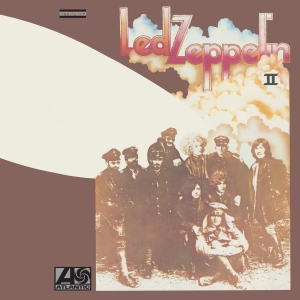Related Research Articles

Led Zeppelin were an English rock band formed in London in 1968. The group comprised vocalist Robert Plant, guitarist Jimmy Page, bassist and keyboardist John Paul Jones, and drummer John Bonham. With a heavy, guitar-driven sound, they are cited as one of the progenitors of hard rock and heavy metal, although their style drew from a variety of influences, including blues and folk music. Led Zeppelin have been credited as significantly impacting the nature of the music industry, particularly in the development of album-oriented rock (AOR) and stadium rock.

Led Zeppelin II is the second studio album by the English rock band Led Zeppelin, released on 22 October 1969 in the United States and on 31 October 1969 in the United Kingdom by Atlantic Records. Recording sessions for the album took place at several locations in both the United Kingdom and North America from January to August 1969. The album's production was credited to the band's lead guitarist and songwriter Jimmy Page, and it was also Led Zeppelin's first album on which Eddie Kramer served as engineer.

Presence is the seventh studio album by the English rock band Led Zeppelin. It was released by the band's own label Swan Song Records on 31 March 1976 in the United States and on 2 April 1976 in the United Kingdom. While the record was commercially successful, reaching the top of both the British and American album charts, and achieving a triple-platinum certification in the United States by the RIAA, it received mixed reviews from critics and is the lowest-selling album by the band.

John Baldwin, better known by his stage name John Paul Jones, is an English musician, songwriter, and record producer who was the bassist and keyboardist for the rock band Led Zeppelin. Prior to forming the band with Jimmy Page in 1968, he was a session musician and arranger. After the death of drummer John Bonham in 1980, Led Zeppelin disbanded, and Jones developed a solo career. He has collaborated with musicians across a variety of genres, including the supergroup Them Crooked Vultures with Dave Grohl, Josh Homme, and Alain Johannes. He was inducted into the Rock and Roll Hall of Fame in 1995 as a member of Led Zeppelin.

Robert Anthony Plant is an English singer and songwriter. He was the lead singer and lyricist of the rock band Led Zeppelin from its founding in 1968 until their breakup in 1980; since then he has had a successful solo career, sometimes collaborating with other artists such as Alison Krauss. Regarded by many as one of the greatest singers in rock music, he is known for his flamboyant persona and raw stage performances.

James Patrick Page is an English musician and producer who achieved international success as the guitarist and founder of the rock band Led Zeppelin. Prolific in creating guitar riffs, Page’s style involves various alternative guitar tunings and melodic solos, coupled with aggressive, distorted guitar tones. It is also characterized by his folk and eastern-influenced acoustic work. He is notable for occasionally playing his guitar with a cello bow to create a droning sound texture to the music.

Coverdale–Page is a collaborative studio album by English singer David Coverdale and guitarist Jimmy Page. It was released on 15 March 1993 by EMI in Europe, 16 March by Geffen Records in North America and 18 March by Sony Music Entertainment in Japan. The album's production was handled by Coverdale, Page and Mike Fraser. Following the disbandment of Coverdale's band Whitesnake and a failed reunion attempt by Page's band Led Zeppelin, John Kalodner proposed the idea to Page of the musicians working together. After meeting each other, they began writing songs, which were then recorded over the course of 1991 and 1992.
A groupie is a fan of a particular musical group who follows the band around while they are on tour or who attends as many of their public appearances as possible, with the hope of meeting them. The term is used mostly describing young women, and sometimes men, who follow these individuals aiming to gain fame of their own, or help with behind-the-scenes work, or to initiate a relationship of some kind, intimate or otherwise. The term is also used to describe similarly enthusiastic fans of athletes, writers, and other public figures.

Beverle Lorence "Bebe" Buell is an American singer and former model. She was Playboy magazine's November 1974 Playmate of the Month. Buell moved to New York in 1972 after signing a modeling contract with Eileen Ford, and garnered notoriety after her publicized relationship with musician Todd Rundgren from 1972 until 1978, as well as her liaisons with several rock musicians during that time and over the following four decades. She is the mother of actress Liv Tyler, whose biological father is Aerosmith frontman Steven Tyler. Todd Rundgren is Liv's legally adoptive father.
Richard Cole was an English music manager, who was involved in the rock music business from the mid-1960s to 2003. He is most known for having been the tour manager of English rock band Led Zeppelin from 1968 to 1980.
"Babe I'm Gonna Leave You" is a folk song written by Anne Bredon in the late 1950s. Joan Baez, who learned the song from a student at Oberlin College, recorded the first published version for her 1962 album Joan Baez in Concert and a variety of musicians subsequently adapted it to a variety of styles, including the Association (1965), Quicksilver Messenger Service (1968), and Led Zeppelin (1969). Following the credit on Baez's 1962 release as "traditional, arranged by Baez", subsequent releases did not name Bredon until 1990 when, following Bredon's approach to the band, she received credit and royalties on Led Zeppelin releases.

"Living Loving Maid (She's Just a Woman)" is a song by English rock band Led Zeppelin from their album Led Zeppelin II, released in 1969. It was also released as a single in Japan and as the B-side of the single "Whole Lotta Love" in the United States.

"Sweet" Connie Hamzy Parente, also called "Sweet Sweet" Connie or Connie Flowers, was an American woman who was known as a groupie who claimed to have had sex with numerous rock musicians. Hamzy also received attention for her claim that she was propositioned by Bill Clinton, then governor of Arkansas.
"Carouselambra" is the fifth song on Led Zeppelin's 1979 album In Through the Out Door. The title refers to the first section of the song that has similarities to carousel music. At more than 10 minutes in length, the song is the second-longest the band recorded in the studio. John Paul Jones' synthesizers dominate the song, with Jimmy Page's guitar playing a supporting role.
"Sick Again" is a song by English rock band Led Zeppelin from their 1975 album Physical Graffiti. It was written by singer Robert Plant. The song is about a group of teen groupies, which Plant referred to as "L.A. Queens", with whom the band were acquainted on their 1973 US Tour.

Ian Hunter Patterson is an English singer, songwriter and musician. He is best known as the lead vocalist of the rock band Mott the Hoople, from its inception in 1969 to its dissolution in 1974, and at the time of its 2009, 2013, and 2019 reunions. Hunter was a musician and songwriter before joining Mott the Hoople, and continued in this vein after he left the band. He embarked on a solo career despite ill health and disillusionment with commercial success, and often worked in collaboration with Mick Ronson, David Bowie's sideman and arranger from The Rise and Fall of Ziggy Stardust and the Spiders from Mars period.

Stairway to Heaven: Led Zeppelin Uncensored is a book written by Richard Cole who was the tour manager for English rock band Led Zeppelin, from their first US tour in 1968 to 1979, when he was replaced by Phil Carlo. The book was co-written with Richard Trubo, a syndicated journalist, and was first published in August 1992.
Rodney Bingenheimer's English Disco was a Los Angeles nightclub located at 7561 Sunset Boulevard on the Sunset Strip from late 1972 until early 1975. It catered to the glam rock movement. The club was infamous for widespread drug use and hosting underage girls at parties, but it was also a popular spot among rockstars, including Cherie Currie, Joan Jett, and Iggy Pop.

Sabel Hay Shields, better known as Sable Starr, was an American groupie, often described as the "queen of the groupie scene" in Los Angeles during the early 1970s. She stated during an interview published in the June 1973 edition of Star magazine that she had met Rod Stewart, Led Zeppelin, Alice Cooper, David Bowie, Mick Jagger, Elton John, and Marc Bolan.
Barbara Cope was an American rock and roll groupie, known in the late 1960s and early 1970s as "The Butter Queen".
References
- 1 2 3 4 5 6 Mattix, Lori (November 3, 2015). "I Lost My Virginity to David Bowie". Thrillist . New York City: Group Nine Media . Retrieved August 13, 2018.
- ↑ Cross, Alan (February 11, 2018). "The music industry is hurtling towards its own #MeToo and #TimesUp reckonings: Alan Cross". Global News . Vancouver, Canada: Corus Entertainment . Retrieved August 24, 2018.
- ↑ Healy, Claire Marie (August 10, 2015). "The 70s groupies who broke the rules of style and sexuality". Dazed . Retrieved April 9, 2020.
- 1 2 3 Williamson, Nigel (August 2, 2007). The Rough Guide to Led Zeppelin . Rough Guides UK. pp. 94, 253–254. ISBN 978-1-84836-226-0.
- ↑ Blake, Mark (October 25, 2018). Bring It On Home: Peter Grant, Led Zeppelin and Beyond: The Story of Rock's Greatest Manager. Hachette UK. p. 182. ISBN 978-1-4721-2687-0.
- ↑ "Jimmy Page: "Forget the myths about Led Zeppelin"". Uncut . February 27, 2015. Retrieved April 9, 2020.
- ↑ Case, George (October 1, 2011). Led Zeppelin FAQ: All That's Left to Know About the Greatest Hard Rock Band of All Time. Rowman & Littlefield. pp. 216–217. ISBN 978-1-61713-074-8.
- ↑ Petal Productions (2007). Led Zeppelin: Way Down Inside (Documentary). United States.
- ↑ Greene, Andy (November 21, 2012). "Jimmy Page Dated a 14-year-old Girl While He Was in Led Zeppelin". Rolling Stone . New York City: Wenner Media LLC. Retrieved August 13, 2018.
- ↑ Hoskyns, Barney (September 4, 2012). Trampled Under Foot: The Power and Excess of Led Zeppelin. Faber & Faber. p. 250. ISBN 978-0-571-25936-6.
- 1 2 3 Des Barres, Pamela (2007). "Lori Lightning". Let's Spend the Night Together: Backstage Secrets of Rock Muses and Supergroupies . Chicago Review Press. pp. 181-182, 183-185. ISBN 978-1-55652-668-8.
- ↑ Buell, Bebe; Bockris, Victor (July 19, 2002). Rebel Heart: An American Rock 'n' Roll Journey . St. Martin's Press. p. 82. ISBN 0312266944.
- ↑ Mick, Wall (November 9, 2010). When Giants Walked the Earth: A Biography of Led Zeppelin. Macmillan Publishers. p. 324. ISBN 978-1429985611.
- ↑ Kellett, Andrew (September 9, 2017). The British Blues Network: Adoption, Emulation, and Creativity. University of Michigan Press. p. 99. ISBN 978-0472036998.
- ↑ Calef, Scott (2009). Led Zeppelin and Philosophy : All Will Be Revealed. Open Court Publishing Company. p. 282. ISBN 978-0812696721.
- ↑ Lewis, Dave (1994). The Complete Guide to the Music of Led Zeppelin. Omnibus Press. ISBN 0-7119-3528-9.
- ↑ McNeil, Legs; McCain, Gillian (1996). Please Kill Me: the Uncensored Oral History of Punk (1st ed.). New York City: Grove Press. pp. 137–138. ISBN 978-0-8021-1588-1.
- ↑ Trynka, Paul (March 1, 2011). Starman: David Bowie - The Definitive Biography. London: Little, Brown Book Group. p. 173. ISBN 978-1-84744-238-3.
- ↑ Jones, Dylan (September 7, 2017). David Bowie: A Life. Random House. p. 749. ISBN 978-1-4090-5263-0.
- ↑ McLean, Craig (May 6, 2018). "Good time girl: memories of super groupie Pamela Des Barres". The Guardian . London, England. Retrieved August 13, 2018.
- ↑ Keane, Erin (January 13, 2016). "The dark side of David Bowie: As the mourning goes on, we can't ignore his history with underaged groupies in '70s". salon.com. Retrieved August 26, 2023.
- ↑ De Gallier, Thea (March 15, 2018). "'I wouldn't want this for anybody's daughter': will #MeToo kill off the rock'n'roll groupie?". The Guardian . London, England. Retrieved August 13, 2018.
- ↑ Hains, Rebecca (January 11, 2016). "Reconciling David Bowie's genius with rape". rebeccahains.com. Retrieved August 13, 2018.
- ↑ Williams, Stereo (January 17, 2016). "Not Above the Law: David Bowie and Rock 'n' Roll's Statutory Rape Problem". The Daily Beast . New York City: IAC . Retrieved August 13, 2018.